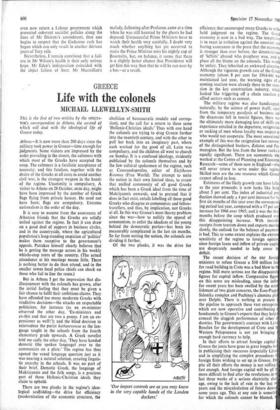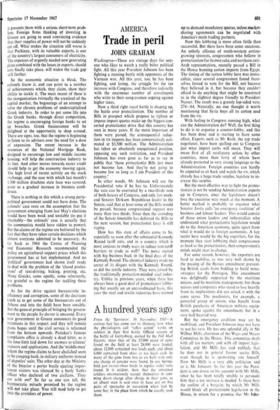Life with the colonels
GREECE MICHAEL LLEWELLYN-SMITH
This is the first of two articles by the SPECLi- TOR's correspondent in Athens, the second of which will deal with the ideological life of Greece today.
Athens—It is now more than 200 days since the military took power in Greece—time enough for judgments. Some visitors are impressed by the order prevailing in the streets, the calmness with which most of the Greeks have accepted the coup. The calmness is a fatalistic acceptance of necessity; and this fatalism, together with the desire of the Greeks at all costs to avoid another civil war, is the strongest weapon in the hands of the regime. Unanimity is compulsory. A visitor to Athens on 28 October, ocat day, might have been impressed by the number of Greek flags flying from private houses. He need not have been; flags are compulsory. Extreme nationalism is the order of the day.
It is easy to assume from the assurances of Athenian friends that the Greeks are solidly united against the regime. In fact it can draw on a good deal of support in business circles, and in the countryside, where the agricultural population's long-standing suspicion of 'politics' makes them receptive to the government's appeals. Pattakos himself clearly believes that he is getting the message across in his weekly whistle-stop tours of the country. (The actual attendance at his meetings means little. There is nothing better to do than attend, and in the smaller towns local police chiefs can check on those who fail to line the route.)
But in Athens I get the impression that dis- illusionment with the colonels has grown, after the initial feeling that they must be given a fair chance to fulfil their ambitious claims. They have offended too many moderate Greeks with vindictive decisions—the attacks on respectable politicians, for instance (as an ex-minister observed the other day, `Ex-ministers and ex-this and that are two a penny. / am an ex- pensioner as well !'); and the blind decision to reintroduce the purist katharevousa as the lan- guage taught in the schools from the fourth elementary grade upwards. A Greek novelist told me sadly the other day, 'They have handed demotic (the spoken language) over to the communists on a plate.' The regime has thus opened the vexed language question just as it was nearing a natural solution, creating linguis- tic anarchy in the schools. It was no part of their brief. Demotic Greek, the language of Makriyannis and the folk songs, is a precious part of those Hellenic-Christian ideals they claim to uphold.
There are two planks in the regime's ideo- logical scaffolding—the drive for efficiency (modernisation of the economic structure, the
abolition of bureaucratic muddle and corrup- tion), and the call for a return to these same 'Hellenic-Christian ideals.' Thus with one hand the colonels are trying to drag Greece further into the twentieth century, and with the other to pull her back into an imaginary past, where each worked for the good of all, Latin was compulsory, and the children all went to church on Sunday. It is a confused ideology, stridently publicised by the colonels themselves and by the few cultural spokesmen of the regime, such as Constandopoulos, editor of Eleftheros Kosmos (Free World). The attempt to unite the nation in their own limited ideas, to create that unified community of all good Greeks which has been a Greek ideal from the time of Makriyannis onwards, and to pretend that it does in fact exist, entails labelling all those good Greeks who disagree as communists and fellow- travellers, and thus, by implication, not Greeks at all. In this way Greece's most thorny problem since the war—how to nullify the appeal of communism, to enlist the idealism of the young behind the democratic parties—has been im- measurably complicated in the last six months. So far from uniting the nation, the colonels are dividing it further.
Of the two planks, it was the drive for 'Our import controls are as you may know in the very capable hands of the London dockers.' efficiency that encouraged many Greeks to with. hold judgment on the. regime. The Greek economy is now in a bad way. The temptation is to react in irritation against the constant and boring assurances in the press that the economy is stronger than ever before, the denunciations of 'leftists' abroad who prophesy woe, and to place all the blame on the colonels. This would be unfair. They-inherited an awkward situation. Although the vigorous growth rate of the Greek economy (about 8 per cent for 1964-66) was maintained last year, the warning signs of a coming reaction were already there in the reces. sion in the key construction industry, which looked like triggering off a chain reaction it, allied sectors such as cement.
The military regime was also handicapped, naturally, by the seizure of power itself; apart from the temporary paralysis of business and the disastrous fall in tourist figures, there was the ultimately more damaging loss of skills and experience entailed in the departure, resignation or sacking of men whose loyalty was suspect or who would not cooperate. The most sensational example of this was the resignation last summer of the distinguished bankers, Zolotas and Pez. mazoglou. But the loss from the lower ranks is equally significant. There are economists who worked at the Centre of Planning and Economic Research—some of them now in England—who will never return to serve under this regime. Skilled men are the, one resource which Greece cannot afford to lose.
Estimates of the likely growth rate have fallee as the year proceeds; it now looks like beinj about 5 per cent. The index of industrial pro. duction showed only a 4 per cent increase for the first six months of this year over the correspon ing period last year, compared with a 17 per cent increase for 1966 over 1965; and it was the three months before the coup which produced ev this disappointing increase. With invisib receipts from tourism down and exports movi slowly, the outlook for the balance of paymen is bad. This to some extent explains the extre sensitivity of the regime to foreign opinio since foreign loans and inflow of private cap are desperately needed to help cover deficit.
The recent decision of the EEC forei ministers to refuse Greece a $10 million lo for road building in Crete was a bad blow to regime. Still more serious are the disappointi figures for capital inflow. Comparative figu on this score are misleading, since the info for recent years has been swelled by the esta lishment of two giant concerns, the Esso-Papp Salonika complex and Pechiney's alumina pla near Delphi. There is nothing at present the pipeline to approach these vast enterpris which are now operative and contributing handsomely to Greece's exports that they help conceal the sluggish performance of other dustries. The government's contract with Litt Benelux for the development of Crete and Western Peloponnese is not yet bringing enough bard currency to help.
In their efforts to attract foreign capital Greece the junta have gone to great lengths ho in publicising their successes (especially Litto and in simplifying the complex procedures f foreign firms wishing to set up in Greece. D pite all their efforts the money is not rolling fast enough. And foreign capital will be all more difficult to find after the revelations in last three weeks of a serious electricity sho age, owing to the lack of rain in the last years and the miscalculation of future deem some years ago. This at any rate is someth for which the colonels cannot be blamed,
it presents them with a serious short-term prob- lem. Foreign firms thinking of investing in Greece are going to need convincing evidence that their supplies of power will not be suddenly cut off. What makes the situation still worse is that Pechiney, with its valuable exports, is one of the country's largest consumers of electricity. The expenses of urgently needed new generating plant combined with the losses in exports, should cuts finally take place, will widen the trade gap still further.
So the economic situation is bleak. The colonels know it, and can point to a number of achievements which, they claim, show their ability to tackle it. The most recent of these is the reorganisation (virtually the creation) of the capital market, the beginnings of an attempt to solve the chronic problems of undercapitalised Greek industry. In order to put some life into the Greek banks, through direct competition, the regime is encouraging foreign banks to set up branches. Greek businessmen will be delighted at the opportunity to shop around. There are signs, too, that the regime is beginning to listen to its advisers over the need for a dose of expansion. The recent increase in the resources of the National Mortgage Bank, designed to encourage low and middle income housing, will help the construction industry to its feet. And other moves towards easier credit should help to get the economy moving again. The high level of recent activity on the stock exchange, and the ease with which last month's 1,500 million drachma state loan was covered, point to a gradual increase in business confi- dence.
There is nothing in this which a strong party- political government could not have done. The colonels' case rests on the assumption that the government emerging from last May's elections would have been weak and unstable (to put it charitably—the colonels' case is actually that the communists would have ridden to power). But the claims of the regime are bolstered by the fact that they have taken certain decisions which almost everyone admitted to be necessary. As far back as 1964 the Centre of Planning and Economic Research recommended the policy on agricultural support prices which this government has at last implemented. And no 'political' government had shown itself ready to deal with the problem of the 'closed profes- sions' of taxi-driving, baking, printing, etc. Many Greeks, some openly, some reluctantly, are grateful to the regime for tackling these problems.
As for the drive against bureaucratic in- efficiency and corruption, some of the decisions (such as to get some of the bureaucrats out of Athens and into the field) have been sensible. But the general principle of bringing the govern- ment to the people by decree is unsound. Every new government in Greece announces its good intentions in this respect; and they will remain pious hopes until the civil service is reformed from the bottom upwards. Pattakos's famous complaints office is already a dead letter, as is the time-limit laid down for answers to citizens' requests and applications. And the 'middle-men' whom the regime claims to have abolished seem to be creeping back, in military uniforms instead of deputies suits. The other day at the Ministry of the Interior a porter busily ejecting impor- tunate visitors was silenced by a burly Tanks officer who declared of two civilians, 'They are :with me' So far as one can tell, the bureaucratic miracle promised by the regime Will not take place. You still need help to get into the corridors of power.



































 Previous page
Previous page